Estpr13 , Nice roo. How old is he and what color cornish did you breed your Del to to get those colors?
Navigation
Install the app
How to install the app on iOS
Follow along with the video below to see how to install our site as a web app on your home screen.
Note: This feature may not be available in some browsers.
More options
You are using an out of date browser. It may not display this or other websites correctly.
You should upgrade or use an alternative browser.
You should upgrade or use an alternative browser.
DelawaresxCornish???
- Thread starter heritagehabitatfarms
- Start date
- May 13, 2008
- 10,684
- 193
- 321
Quote:
Would it be Ok with you if we discuss some of the finer points of this roo X ??. Tell us some more info on him first, What generation is he??, how did you cross which way ( hen breed over roo breed & vise versa ). Was he the only one and what did the others look like??. things like that.
AL
Would it be Ok with you if we discuss some of the finer points of this roo X ??. Tell us some more info on him first, What generation is he??, how did you cross which way ( hen breed over roo breed & vise versa ). Was he the only one and what did the others look like??. things like that.
AL
Hi all,
This Delcorn is one of 16 eggs I got off ebay from a lady in Arkansas called godzillaskitty. All 16 eggs hatched out for me on 11-11-08 so they are just over one year of age. This one weighs 8 pounds 15 ounces as of 11-11-09. I had three of the 7 roos look like this guy. I think he is a cross between a Dark Cornish roo with Delaware hens.
The others looked more like mutts. Some with single combs and others with button like combs but all had feathering that looked dirty like one of the hens in the background. Of the 8 chickens that I kept, I kept the ones that looked the most like Delawares. One that I gave away had dark feathering as if his sire was a Dark Cornish.
I don't know much more about them but that they seem to be slower growing. They didn't crow until around 8 months (which is good for me living in the city). They have excellent personalities which is why I kept them instead of processing them, and the third roo, which looked like this one, tasted really good. I am now down to two roos and three hens.
As far as comments... knock yourselves out. He's a mutt in reality. He doesnt match a Del or Cornish. I kept them for there personalities and taste. Kind of like the freedom rangers. The thread question was about the cross and I just happen to have some of the cross and am telling about my experiences.
This Delcorn is one of 16 eggs I got off ebay from a lady in Arkansas called godzillaskitty. All 16 eggs hatched out for me on 11-11-08 so they are just over one year of age. This one weighs 8 pounds 15 ounces as of 11-11-09. I had three of the 7 roos look like this guy. I think he is a cross between a Dark Cornish roo with Delaware hens.
The others looked more like mutts. Some with single combs and others with button like combs but all had feathering that looked dirty like one of the hens in the background. Of the 8 chickens that I kept, I kept the ones that looked the most like Delawares. One that I gave away had dark feathering as if his sire was a Dark Cornish.
I don't know much more about them but that they seem to be slower growing. They didn't crow until around 8 months (which is good for me living in the city). They have excellent personalities which is why I kept them instead of processing them, and the third roo, which looked like this one, tasted really good. I am now down to two roos and three hens.
As far as comments... knock yourselves out. He's a mutt in reality. He doesnt match a Del or Cornish. I kept them for there personalities and taste. Kind of like the freedom rangers. The thread question was about the cross and I just happen to have some of the cross and am telling about my experiences.
Okay here are a few more pictures.

This is one of the Delcorn hens

Here is a picture of a roo and a second hen. She is black and white with no brown.

I tried to get a front on picture but this was the best I could get.

This is some 15 week old offspring from the Delcorns along with some Jersey Giant crosses and a full grown Bantam Barred Rock roo

This is an example of the type roos that I culled from the first set of chicks.
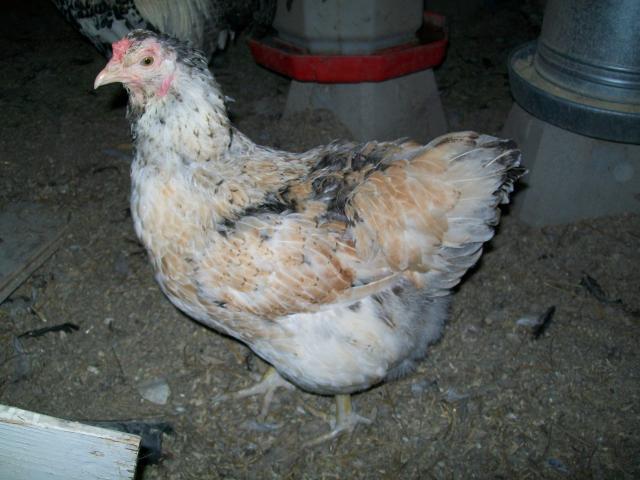
This is one of the Delcorn hens
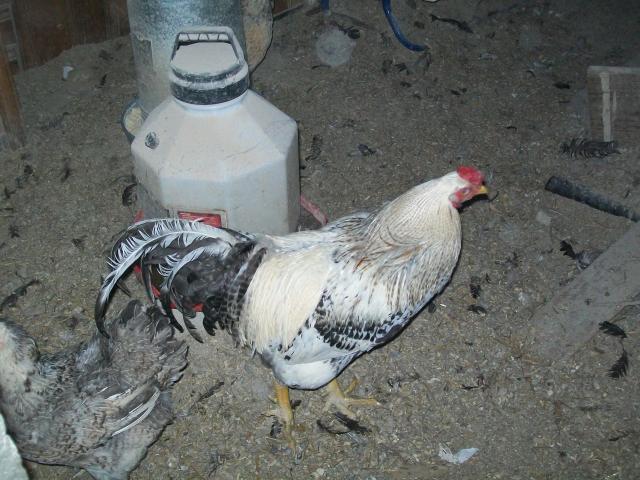
Here is a picture of a roo and a second hen. She is black and white with no brown.
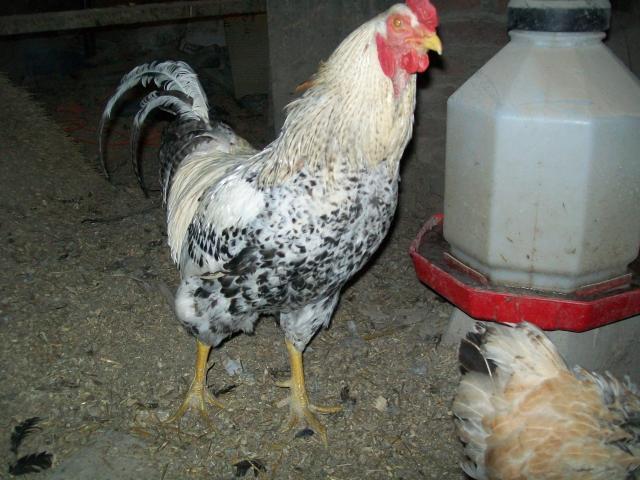
I tried to get a front on picture but this was the best I could get.
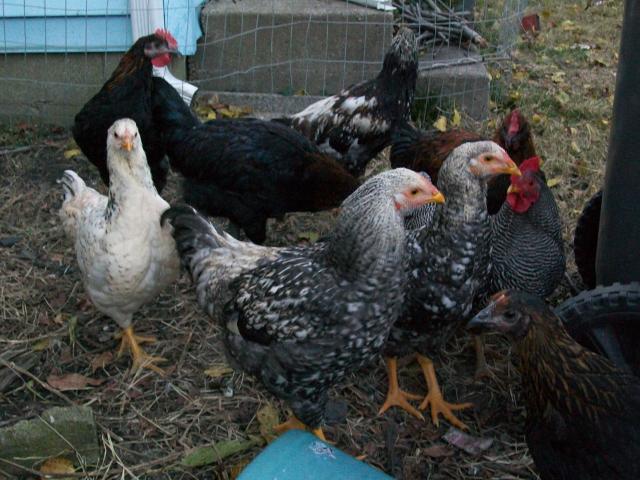
This is some 15 week old offspring from the Delcorns along with some Jersey Giant crosses and a full grown Bantam Barred Rock roo
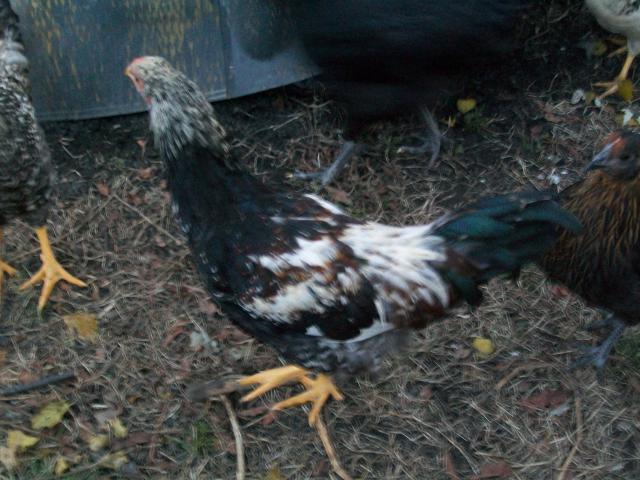
This is an example of the type roos that I culled from the first set of chicks.
- Thread starter
- #75
thanks for the pic's its nice to see the crosses like that to know what happens with that cross...
He doesn't look like he has alot of breast meat on him, am I correct? When you processed what was the best part of him? Breast, legs, thigh? Did he have alot of fat?
- May 13, 2008
- 10,684
- 193
- 321
He does appear to have allot of fluff and not much meat, this is common in your first offspring. I would pick out the best traits and then breed for those, in you case start with the head it is very typey from the comb and wattles to the head and eye. Montitor and take notes as growth progresses. now is a good time to start your out cross breeding for the traits you want= breast size and cemitry, bone and carraige size, skin color ect. The rooster will pass on different traits than the hen so pick your breeders accordingly to maximize the pairing.
AL
AL
Quote:
I would say the two roos that I processed and these two as well, had average to just above average breasts. Their keels are not as prominent as those of Delawares that I had, if I remember correctly. Haven't had Dels in over a year.
There is quite a bit of fluff compared to a Cornish, about as much as a Delaware. When processed the two roos had good size breast and drumsticks both. Nothing to brag about, just not small, or skinny.
There are two main reasons I decided to keep these guys. The first is because they didn't start crowing until about 6 months of age and then didn't crow that much. Perhaps because the dominate roo did the crowing. When I culled the dominate roo (Dark Jersey X) These guys started crowing more. Me living in the city, noise is a big consideration. I've had other breeds start crowing at 5 weeks.
The second reason I kept these for breeding is because the one cooked by my neighbor was very good tasting. The meat wasn't loose like Cornish X's or fast food chickens. Delawares are supposed to be good tasting and on the Ark of Taste. So I am shooting for a Larger breasted Delaware that has a distinct comb so as to not be confused with them.
A third reason I kept them is because the roos, while not "friendly" don't run away, or act aggressive like the Delaware roos that I had. They stay about arms length away, act as if curious, and don't mind much if picked up. But I tend to handle them fairly regularly. I try to reach out and stroke their breasts. They really don't like having a hand coming down at them to try to stroke their backs. They will run away if you try that.
As far as breeding; the original hens are mostly small, disappointing for meat birds. They are somewhat friendly. Their offspring vary widely. I have a nice looking young hen that is almost half the size of another hen the same age. Comb type and overall size then color is what I am culling for now.
Thanks for the advice al6517 I will try to outcross but need to get some breeding stock. I have a few months to work on getting some. I am nearly clueless about good breeding proceedures. I have been muddleing through for years, keeping a roo for only one season. These guys will be the first in line breeding that I will do.
I generally try to keep a closed flock and only buy eggs that I hatch out. I had a bad experience with some healthy birds that ended up being carriers. Thank goodness I put them in with some culls prior to introducing them to the flock. I had to cull all the young culls that had been exposed.
I am starting to ramble so I'm ending it here.
Rick
I would say the two roos that I processed and these two as well, had average to just above average breasts. Their keels are not as prominent as those of Delawares that I had, if I remember correctly. Haven't had Dels in over a year.
There is quite a bit of fluff compared to a Cornish, about as much as a Delaware. When processed the two roos had good size breast and drumsticks both. Nothing to brag about, just not small, or skinny.
There are two main reasons I decided to keep these guys. The first is because they didn't start crowing until about 6 months of age and then didn't crow that much. Perhaps because the dominate roo did the crowing. When I culled the dominate roo (Dark Jersey X) These guys started crowing more. Me living in the city, noise is a big consideration. I've had other breeds start crowing at 5 weeks.
The second reason I kept these for breeding is because the one cooked by my neighbor was very good tasting. The meat wasn't loose like Cornish X's or fast food chickens. Delawares are supposed to be good tasting and on the Ark of Taste. So I am shooting for a Larger breasted Delaware that has a distinct comb so as to not be confused with them.
A third reason I kept them is because the roos, while not "friendly" don't run away, or act aggressive like the Delaware roos that I had. They stay about arms length away, act as if curious, and don't mind much if picked up. But I tend to handle them fairly regularly. I try to reach out and stroke their breasts. They really don't like having a hand coming down at them to try to stroke their backs. They will run away if you try that.
As far as breeding; the original hens are mostly small, disappointing for meat birds. They are somewhat friendly. Their offspring vary widely. I have a nice looking young hen that is almost half the size of another hen the same age. Comb type and overall size then color is what I am culling for now.
Thanks for the advice al6517 I will try to outcross but need to get some breeding stock. I have a few months to work on getting some. I am nearly clueless about good breeding proceedures. I have been muddleing through for years, keeping a roo for only one season. These guys will be the first in line breeding that I will do.
I generally try to keep a closed flock and only buy eggs that I hatch out. I had a bad experience with some healthy birds that ended up being carriers. Thank goodness I put them in with some culls prior to introducing them to the flock. I had to cull all the young culls that had been exposed.
I am starting to ramble so I'm ending it here.
Rick
One other thing I just thought of. . . I really cannot sex these guys until they are several months old. The exception is those with single combs, but I am culling them. If I spend time with them I could probably sex them earlier but one has to look closely.
- May 13, 2008
- 10,684
- 193
- 321
Good to hear they had some decent meat under the fluff, By outcrossing you get to breed for what you want then once your nearly there start to line breed and cull heavy, every 2nd generation recross with whatever your lacking and continue so on and so forth. it takes a long time but is the best and fastest way to insure success.
AL
AL
New posts New threads Active threads
-
Latest threads
-
Do i have a sick hen?
- Started by Brittanylee89
- Replies: 0
-
Mites or stress plucking??
- Started by JuanitaWilson
- Replies: 0
-
-
-
-
-
Threads with more replies in the last 15 days
-
-
Question of the Day - Friday, February 13th, 2026
- Started by casportpony
- Replies: 93
-
-
-
-
×


